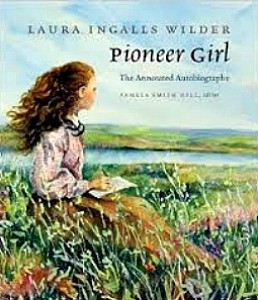
The Horn Book website has lots of material of interest to teachers. Here are some areas to explore. And follow us on Twitter: #lollysclass
|
Interviews with authors and illustrators Recommended books -- reviews and themed book lists |
School -- reading in school, author visits, and more Suggestion box: what else to you want to see in Lolly's Classroom? |
Behind the Scenes of the Little House books
How much time do you devote to researching the books you give your students to read? If you have the time or are really interested in the life of Laura Ingalls Wilder, Pioneer Girl may be for you.
 How much time do you devote to researching the books you give your students to read? If you have the time or are really interested in the life of Laura Ingalls Wilder, Pioneer Girl may be for you. This scholarly book with notes and appendices, edited by Pamela Smith Hill, is for true fans of the series and not necessarily for casual readers.
How much time do you devote to researching the books you give your students to read? If you have the time or are really interested in the life of Laura Ingalls Wilder, Pioneer Girl may be for you. This scholarly book with notes and appendices, edited by Pamela Smith Hill, is for true fans of the series and not necessarily for casual readers.You may know that with the help of her daughter, writer Rose Wilder Lane, Laura Ingalls Wilder, wrote a book series to tell of her family’s days of trying to prosper on the American frontier. What you may not know is that the fictional children’s books series had its origins in a nonfiction manuscript for adults.
The editors have taken pains to verify and provide evidence that supports the facts surrounding the Ingalls family journey, using census records, newspapers accounts, etc. Wilder leaves out most of the family's encounters with others (for example, when they stayed other families on their way to their next home) in order to shape a story of one family’s attempts to conquer the frontier. They actually had more contact with their extended family and neighbors than one would guess from reading the books.
Pioneer Girl shows how Wilder rearranged the details of her real life into a fictional series about one family’s determination. She shaped her parents into consistent characters, even if that meant changing details. Wilder also omitted many of the unsavory things she and her siblings were exposed to — such as public drunkenness, lecherous acquaintances, an aunt’s divorce, and love triangles among neighbors — because such things would not have been welcomed in children’s books in the 1930s when her books were first published.
To say that I was fond of Little House on the Prairie and the other books in the series is an understatement. I read them over and over. And now, after reading Pioneer Girl, I know that the feelings those books stirred were no accident: these are the very feelings Wilder intended to evoke.
However, while I loved the stories, there was much I didn’t understand. I felt confused when Laura’s father participated in a minstrel show. I wondered over an Indian breaking into the house. I did not know how to process the way people of color appeared in the books. When I was older and asked my mother why she didn’t tell me I would have been a slave if I had lived back then (something that may or may not have been true — I don’t know that all of my ancestors were slaves), she responded that she didn’t want to dampen my imagination.
As an adult, I don’t fault my child-self for the fascination nor adults for recommending these books. They have something to offer, even if I think I might have benefited from getting more historical context. If nothing else, someone might have told me just how difficult the pioneer life was (and that it was not as simple as the Oregon Trail computer game made it seem).
RELATED
RECOMMENDED
ALREADY A SUBSCRIBER? LOG IN
We are currently offering this content for free. Sign up now to activate your personal profile, where you can save articles for future viewing.







Add Comment :-
Comment Policy:
Comment should not be empty !!!
Emily Schneider
Several journalists and scholars, including Judith Thurman in the New Yorker, have documented the emphasis on self-reliance in the works of both Laura Ingalls Wilder and her daughter, Rose Wilder Lane. Both, but especially Lane, were opponents of Roosevelt's New Deal, Lane vehemently so. While the Populist legacy in agrarian American life has been a constant since the mid-19th century, many farmers recognized the New Deal as at least a partial solution to their desperate poverty. It seems that Wilder and Lane were not among them. The books are wonderful. The racism that forms a central part of their narrative is not. I am glad that a new scholarly book is available about these complex works. Thank you, Ms.Bradley, for this interesting post. Emily SchneiderPosted : Jul 13, 2015 01:20